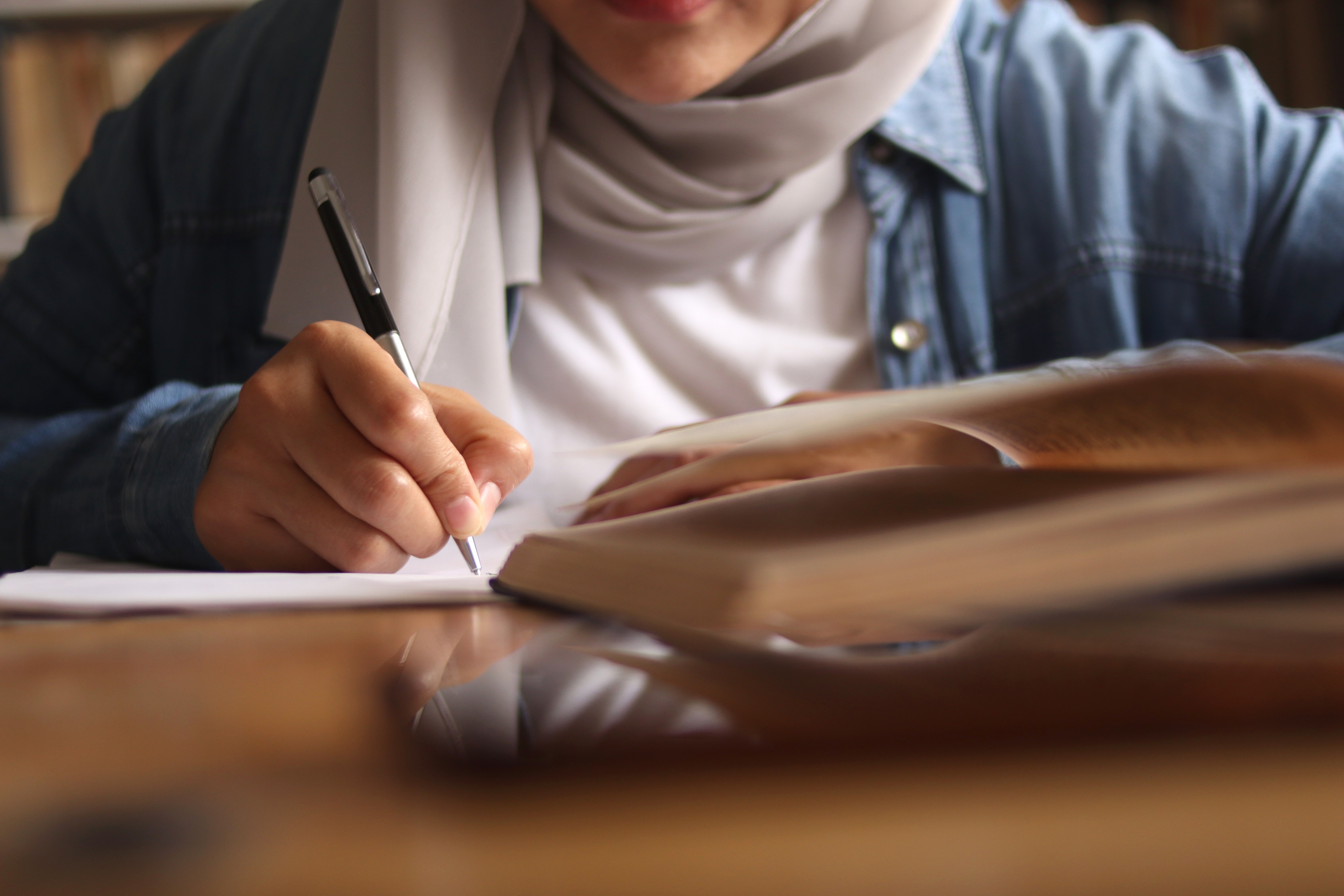أعفانا بيتر كلارك صاحب كتاب "أدوات الكتابة.. 49 استراتيجيّة ضروريّة لكلّ كاتب" من أيّ مقدّمة طويلة قد تشرح وظيفة السّرد بشكل عامّ أو السّرد الصّحفيّ بشكل خاصّ. يكتب كلارك: "كلّ ما عليك فعله هو كتابة جملة حقيقيّة واحدة. اكتب أصدق جملة تعرفها".
وطيلة تاريخ البشريّة، حاول الإنسان أن يبحث عن كلمات صادقة للتّعبير عن أحواله: احتجاج، فرح، تمرد، تأريخ، توثيق...إلخ. ووظّف الفنّ والكلام والرّواية والأدب والخطابة، ليؤسّس لخطاب سرديّ غايته القصوى الإقناع والتّأثير.
ما ينقذ البشرية من النّسيان هو السّرد. الفراعنة بحثوا عن الخلود بالنّقوش على الجدران، العرب حوّلوا شعرهم إلى قصص سرديّة ترصد تفاصيل حياتهم اليوميّة، الأوروبيّون ابتكروا الرّواية بصفتها شكلًا من أشكال الخلود. لقد حوّل البشر السّرد إلى لغة تتملّك الشّخص عن طريق الحكاية.
وحتّى الخطاب الدّينيّ الّذي قاد البشريّة على مرّ القرون، فقد انتبه لخطورة السّرد في حياة النّاس؛ لأنّه يقوم على التّأثير والإقناع والتملُّك كذلك. وفي القرآن الكريم سور كثيرة تضجّ بالسّرد والقصص. لماذا؟ لأنّ بلاغة الإقناع تتوسّل بالحكاية، و"ألف ليلة وليلة" تكشف خطورة السّرد في حياة البشر؛ سرد شهرزاد لم ينقذها فقط من الموت المحتّم، بل حمى جنس النّساء من الانقراض. هكذا يصبح السّرد مخلصًا في الدين كما في الحياة.
لنقرأ هذه العبارة التي أوردها الأستاذ جامع بيضا في كتابه عن تاريخ الصّحافة المغربيّة: "لم يعد الحَكْيُ اختصاصًا للدّولة، صار لها منافس في الكوازيط (الصحف)، وهذا أمر خطير دفع السّلطان لاعتبار الصّحافة من باب "حاطب ليل" ومن "شرّ الأمور محدثاتها"".
لا يرى أمبرتو إيكو، مؤلف "تأمّلات في السّرد الرّوائيّ" الّذي ترجمه سعيد بنكراد، أنّ الرّواية اليوم كما التّاريخ يمكن أن تستغني عن الصّحافة. هذه القدرة على الالتقاط اليوميّ -الّذي كان مذمومًا فيما مضى- لا يوفّرها إلّا السّرد الصّحفيّ.
هكذا، انتقل غابرييل غارسيا ماركيز من الاشتغال في صحيفة مغمورة إلى مجال الأدب، ليصير من الرّوائيّين الكبار في تاريخ الأدب، متّكئًا -كما اعترف بذلك- على التّفاصيل الّتي جمعها أثناء مسيرته الصّحفيّة. وماركيز ليس الوحيد الّذي قادته الصّحافة إلى المجد الأدبيّ، بل نجد أسماء مثل ساراماغو وأمين معلوف وأرنست همنغواي، الّذين قضوا جزءًا كبيرًا من حياتهم في حضن صاحبة الجلالة.
تُمثّل حالة محمد حسنين هيكل تجربةً فريدة في العالم العربيّ؛ إذ نجح في بناء سرديّة مبدعة بالاستناد على حقائق خبريّة وعلى معطيات تاريخيّة وكواليس، مُسبغًا عليها خاصيّة التّشويق.
السّرد الصّحفيّ متشعّب، وإذا خضنا في أقسامه فسنتوه في التّفاصيل، وسنجد أنفسنا ننظر للسّرد في الصّحافة التّقليديّة، الصّحافة الجديدة، ثمّ يمكن تحديد خصائصه في وسائل التّواصل الاجتماعيّ، وعلى التّطبيقات الّتي لا تتوقّف عن التّطوّر.
مهما كانت الاختلافات والتّمايزات بين السّرد في الصّحافة، إلّا أنّ القالَب واحد، يمتح من الأدب لكنّه لا يتماهى معه، ويستعين به لكنْ لا يتبنّاه؛ إنّه نوع من الدُّربة يصقلها الصّحفيّ بالقراءة والقدرة على التقاط الأشياء الّتي يراها الآخرون هامشيّة وغير جديرة بالاهتمام.
لا يمكن أن ينهض السّرد في الصّحافة في بيئة تعادي الحرّيّة؛ لأنّ من شروطه الأساسيّة أن يكون متحرّرًا من ثقل الرّقابة الذّاتيّة، والضّغوط السّياسيّة، وكلّ المؤثّرات الّتي تُفضي إلى البتر، أو الحذف، أو الانتقاء...
وفي عصر الصّحافة الرّقميّة القادرة على التّأثير الجماهيريّ، تُقوّض الوظيفة الاقتصاديّة لوسائل الإعلام السّمة الفطريّة والتّلقائيّة للسّرد، بمعنى آخر، فإنّ السّياسيّين والمعلنين يتحكّمون في إيقاع السّرد، ليصبح جزءًا من الأيديولوجيا.
كي تسرُد، تحتاج إلى تملّك المهنة واللّغة، ومن سمات الحَكْي الاختصار والإيجاز. أن تكتب قصّة خبريّة، يعني أن تبسط الحقائق دون الإغراق في التّفاصيل الّتي لن تفيد القارئ. حينما قُدِّمَت رواية أدبيّة شهيرة لناشر معروف، قال فيما يشبه السّخرية "قد أكون محدود التّفكير، لكنّي لا أستطيع فهم كيف يكتب شخصٌ ثلاثين صفحة لكي يصف لنا كيف يتقلّب في فراشه قبل أن يداعب النّوم جفنيه".
ما الفائدة اليوم في أن يقول الصّحفي أو يكتب أنّه "عصر رطب شديد الحرارة" أو أنّ "السّماء تمطر، لقد بلّلت كل شيء"؟ وما الفائدة أيضًا في أن يحكي الصّحفيّ عن المعطيات المتوفّرة في كلّ مكان؟ ستختلّ وظائف السّرد حينما تحيد عن التّكثيف الّذي له علاقة وطيدة بالزّمن.
ولا يمكن أن يحدث التّأثير في السّرد الصّحفيّ، إذا أغرق في الاحتفاء بأحكام القيمة والكليشيهات، أو إذا اطمأنّ للمسلّمات اللّغويّة؛ كأن يكتب الصّحفيّ: أبيض كالثّلج، أو أسود كالفحم، أو إفريقيا السّوداء. وهي مطبّات يسقط فيها الصّحفيّون غالبًا بسبب اللّجوء إلى الاقتباس.
الصّحفيّ الجيّد هو من يتحكّم في إيقاع القصّة: التّشويق، الإبطاء، التّسريع، خلق حالة التّشويق. ولن يستطيع الإمساك بها دون اختيار عناصرها قبل البدء بالكتابة. وبرغم أنّ مِن وظائفه استثارة الحواس، فإنّ السّرد الصّحفيّ ممارسةٌ واعية، تبتغي أن تبرز أصالة صوت الصّحفيّ/ السّارد، عبر تحويل المألوف إلى غريب يشدّ انتباه القارئ.
حين فكرنا في إصدار هذا الكتاب كان الهاجس الذي يشغلنا أن ننتقل بالسرد من مجرد احتفاء باللغة إلى احتفاء بالمعلومات والبيانات أولا ثم يأتي السرد، فيما بعد، ليشكل الوعاء الذي يستوعب القصة الصحفية. قادنا البحث إلى قناعة أساسية وهي أن الصحفيين العرب لا يقيمون الحد بين السرد كطريقة في بناء المعطيات وتجويد المادة الصحفية وبين اللغة كإنشاء يفسد متعة القراءة. على هذا الأساس، طرحنا الأسئلة التالية:
هل يمكن أن يحافظ السّرد الصّحفيّ اليوم على وظيفته "الاستشفائيّة" أمام تطوّر لا يرحم في التّكنولوجيا الحديثة؟ هل ما يزال الإنسان محور الحكاية؟ كيف نحكي قصّة صحفيّة؟ وأين ينتهي الأدب، وتبدأ الصحافة؟ وما مساحة التّعايش بينهما؟ وكيف تبرز الأشكال السّرديّة الجديدة؟ وما التّقنيات الّتي ينبغي على الصّحفي أن يتوفّر عليها من أجل بناء قصّة سرديّة مكثّفة ومشوّقة؟
أسئلة تمنح معهد الجزيرة للإعلام تأشيرةَ رصد تجربة السّرد الصّحفيّ في العالم العربيّ، بعيدًا عن الأحكام التّقليديّة الّتي تربط السّرد باللّغة أو بالأدب. ربما طغى النّقاش حول الأدب في الصّحافة، لكنّ مقالات وأبحاثًا قليلة قاربت ثيمة السّرد بصفتها تقنية تستعير من الخيال لفحص وقائع حقيقيّة.
يهدف الكتاب أوّلا، لطرح أسئلة عن توظيف السّرد في الصّحافة العربيّة، كما أنّه يشكّل دليلًا إرشاديًّا يتضمّن قواعد وقوالب صاغها كتّاب كبار من العالم العربيّ بناء على تجربتهم العمليّة، وبناء على الخبرة الّتي راكموها، سواء في الصّحافة أو في مجال السّرد، آملين أن يشكّل الكتاب "منهاجًا" لمن يريد أن يحكي قصّة جيّدة.


















![Palestinian journalists attempt to connect to the internet using their phones in Rafah on the southern Gaza Strip. [Said Khatib/AFP]](/sites/default/files/ajr/2025/34962UB-highres-1705225575%20Large.jpeg)




















